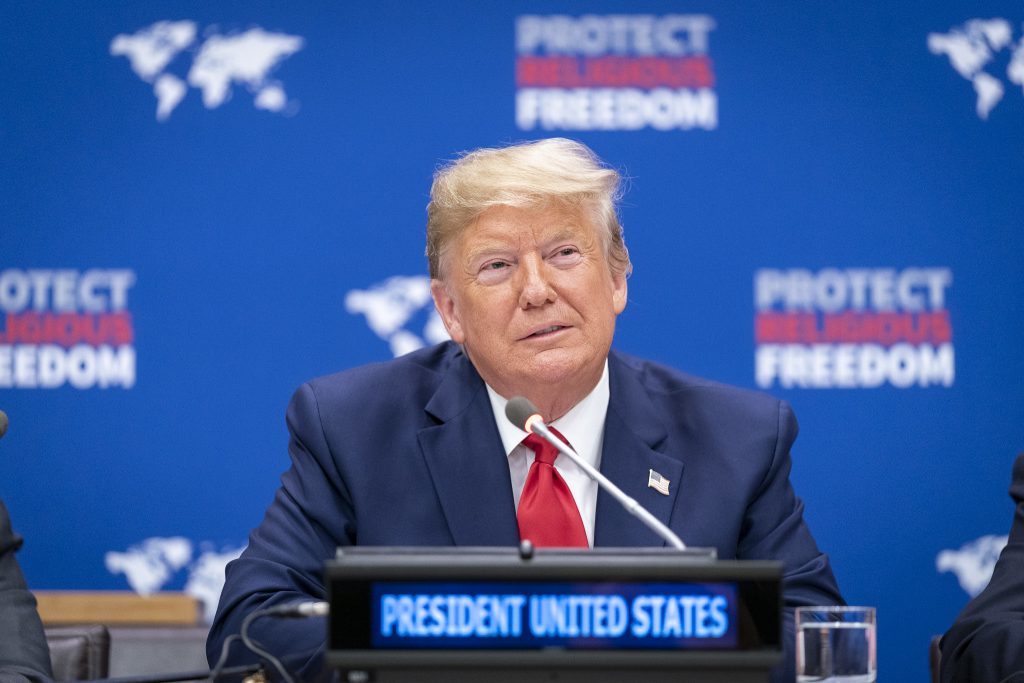Image Credits: The White House/Flickr.
In our own ways, Nancy and I both covered the subject of the president’s crumbling excuses yesterday. It was an obvious take to explain why 30 House Republicans stormed a secure room in the Capitol to disrupt the testimony of the Deputy Assistant Secretary of Defense.
Everywhere you care to look, people are repeating the old saw about lawyers pounding the table when both the facts and the law are against them, and the congressional sit-in on Wednesday fit the bill. I suppose the stunt energized the president’s defenders, but daily tactics don’t add up to a long-term strategy.
Some time after 2 p.m., Mr. [House Minority Whip, Steve] Scalise and several of his fellow protesters re-emerged to complain to the assembled media about the “Soviet-style tactics” of the inquiry.
The entire spectacle was a circus — which was the point. This was a publicity stunt aimed at delegitimizing the impeachment investigation that Mr. Trump and his defenders have portrayed as a partisan inquisition. If a few rules and national security precautions got violated along the way, so be it.
The biggest flaw with Trump’s strategy so far is that he’s been using messaging that has no staying power. At first, he focused on the anonymous CIA whistleblower and anybody who might have talked to him. But, almost immediately, the White House confirmed the substance of the whistleblower’s complaint by releasing a “transcript” of his call with Ukrainian president Volodymyr Zelensky. That rendered the source of the tip irrelevant, and subsequent testimony before Congress from direct witnesses has completely eliminated any need to hear anything more from the original source.
Trump next explained that he didn’t want to release money or arms to Ukraine until he was assured that they were going to do more to address corruption. This was supposedly the key reason why aid was held up. But there is now plenty of testimony that corruption was not the focus of negotiations with the Ukrainians, and on Wednesday reporting from the Washington Post destroyed Trump’s claim by demonstrating how he wanted to severely cut all the anti-corruption money in the budget for Ukraine.
Then there’s the news the New York Times broke on Wednesday that debunked Trump’s insistence that the Ukrainians couldn’t have been extorted over military aid because they did not know the aid was being withheld. The problem here is that they actually did know.
Numerous news outlets, including The Hill, are reporting that Republican senators are getting a little nervous watching this spectacle. As a result, they’re falling back on the supposed lack of transparency argument that animated the House Republicans’ sit-in.
Sen. John Thune (R-S.D.) said on Wednesday that it was difficult to draw “hard, fast conclusions” from a top U.S. diplomat’s closed-door testimony but that the “picture” from initial reports was “not a good one.”
“The picture coming out of it based on the reporting that we’ve seen is, yeah, I would say not a good one,” Thune told reporters when a reporter characterized William Taylor’s testimony as “troubling.”
“But I would say also that, again, until we have a process that allows for everybody to see this in full transparency, it’s pretty hard to draw any hard, fast conclusions,” Thune added.
But this argument, too, doesn’t have much of a future.
House Democrats are preparing to move their largely private impeachment inquiry onto a more public stage as soon as mid-November and are already grappling with how best to present the complex Ukraine saga to the American people…
…Among the witnesses Democrats hope to question in open session are the acting ambassador to Ukraine, William B. Taylor Jr., and his predecessor, former ambassador Marie Yovanovitch…
…Another top priority for many Democrats is John Bolton, Trump’s former national security adviser, who made known around the White House his visceral opposition to the campaign to pressure Zelensky, a campaign directed in part by Trump’s personal attorney Rudolph W. Giuliani.
Testimony from Bolton could be particularly devastating for the White House…
To review, among the defenses the White House and Republicans have erected, all are already in ruins or soon to be reduced to rubble.
- The whistleblower wasn’t a direct witness to anything.
- The call was mischaracterized.
- Aid was held up due to concerns about corruption.
- You can’t extort someone who doesn’t know they’re being extorted.
- The process isn’t fair because it’s being conducted behind closed doors.
